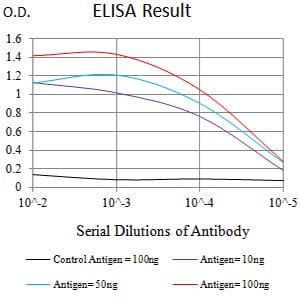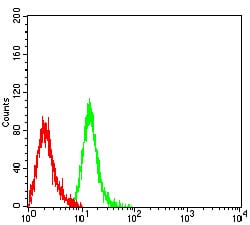

| WB | 咨询技术 | Human,Mouse,Rat |
| IF | 咨询技术 | Human,Mouse,Rat |
| IHC | 咨询技术 | Human,Mouse,Rat |
| ICC | 技术咨询 | Human,Mouse,Rat |
| FCM | 1/200 - 1/400 | Human,Mouse,Rat |
| Elisa | 1/10000 | Human,Mouse,Rat |
| Aliases | VSIR; B7H5; GI24; B7-H5; PD-1H; SISP1; PP2135; C10orf54; DD1alpha |
| Entrez GeneID | 64115 |
| clone | 6E4H3 |
| WB Predicted band size | 34kDa |
| Host/Isotype | Mouse IgG1 |
| Antibody Type | Primary antibody |
| Storage | Store at 4°C short term. Aliquot and store at -20°C long term. Avoid freeze/thaw cycles. |
| Species Reactivity | Human |
| Immunogen | Purified recombinant fragment of human VISTA (AA: extra 33-194) expressed in HEK293 cells. |
| Formulation | Purified antibody in PBS with 0.05% sodium azide |
+ +
以下是关于VISTA抗体的3篇代表性文献摘要(基于公开信息整理,具体内容请以原文为准):
---
1. **文献名称**:*VISTA is an acidic pH-selective ligand for PSGL-1*
**作者**:John P. et al. (2022)
**摘要**:该研究揭示了VISTA蛋白在肿瘤微环境酸性条件下与PSGL-1结合的新机制,并开发了靶向此互作的特异性单克隆抗体。实验表明该抗体可逆转T细胞耗竭,增强抗肿瘤免疫反应。
---
2. **文献名称**:*Structural characterization of VISTA for antibody design*
**作者**:Wang L. et al. (2020)
**摘要**:通过冷冻电镜解析了VISTA的晶体结构,确定其与抗体结合的关键表位,并基于此设计出具有高亲和力和阻断效力的抗体,为后续临床开发奠定结构基础。
---
3. **文献名称**:*VISTA blockade synergizes with PD-1 inhibition in tumor models*
**作者**:Le Mercier I. et al. (2019)
**摘要**:研究发现VISTA抗体单药治疗可抑制多种小鼠肿瘤模型生长,且与PD-1抗体联用显著增强疗效。机制研究表明VISTA抗体通过调节Treg细胞和髓系细胞功能发挥协同抗肿瘤作用。
---
如需具体文献DOI或补充其他方向研究,可进一步说明需求。
VISTA (V-domain Ig suppressor of T-cell activation), also known as PD-1H or DD1α, is an immune checkpoint protein identified in 2011 as a critical regulator of T-cell function. Structurally, it belongs to the B7 family of immunomodulatory molecules and is expressed on myeloid cells, regulatory T cells (Tregs), and activated T cells. Unlike PD-1 or CTLA-4. VISTA functions as both a ligand and receptor, primarily suppressing T-cell activation and cytokine production. It plays a dual role in maintaining immune tolerance and promoting tumor immune evasion by creating an immunosuppressive microenvironment.
Preclinical studies highlight its overexpression in various cancers, correlating with poor prognosis and resistance to existing immunotherapies. VISTA inhibitors, including monoclonal antibodies and small molecules, are under investigation to block its immunosuppressive signals and enhance antitumor immunity. Early-phase clinical trials suggest potential in treating "cold" tumors unresponsive to PD-1/PD-L1 therapies. However, challenges remain, such as understanding its complex signaling mechanisms and optimizing combination strategies with other therapies. VISTA represents a promising yet underexplored target in the evolving landscape of cancer immunotherapy.
×